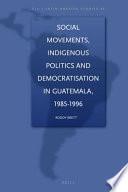
Social Movements for Global Democracy
Contested globalizations -- Rival transnational networks -- Politics in a global system -- Globalizing capitalism : the transnational neoliberal network in action -- Promoting multilateralism : social movements and the UN system -- Mobilizing a transnational network for democratic globalization -- Agenda-setting in a global polity -- Domesticating international human rights norms -- Confronting contradictions between multilateral economic institutions and the UN system -- Alternative political spaces : the world social forum process and "globalization from below" -- Conclusions: Network politics and global democracy
- ISBN 13 : 9780801887444
- ISBN 10 : 0801887445
- Judul : Social Movements for Global Democracy
- Pengarang : Jackie Smith, Professor Jackie Smith, Professor Jackie Smith,
- Kategori : Political Science
- Penerbit : JHU Press
- Bahasa : en
- Tahun : 2008
- Halaman : 286
- Google Book : http://books.google.com/books?id=1T-Uu8uGSLAC&dq=intitle:SOCIAL+MOVEMENT&hl=&source=gbs_api
-
Ketersediaan :
Contested globalizations -- Rival transnational networks -- Politics in a global system -- Globalizing capitalism : the transnational neoliberal network in action -- Promoting multilateralism : social movements and the UN system -- ...









